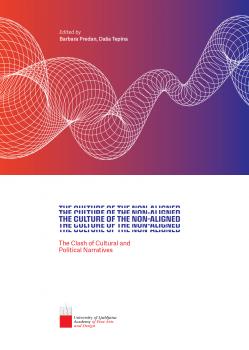The Culture of Non-Alignment: The Clash of Cultural and Political Narratives
Kratka vsebina
The present publication is the final monograph of the basic research project Models and Practices of Global Cultural Exchange and Non-Aligned Movement: Research in the Spatio-Temporal Cultural Dynamics, which combined research in the fields of history, art history, design, culture, economics and sociology in an interdisciplinary and bilateral manner (bringing together researchers from Slovenia and Croatia). The research was based on the hypothesis that the accelerated process of decolonisation in the 1960s, which defined the articulation of cultural needs and cultural policies in the countries of the Non-Aligned Movement, created new institutional mechanisms and new models or practices of cultural exchange. As demonstrated through the examples selected in our three-year study, this led to effects at the level of the Non-Aligned Movement that manifested in the global cultural and artistic field. In terms of content, the monograph can be roughly divided into two parts. The first part consists of papers that provide an in-depth view of the period through the lens of economics, art and design. The second part of the monograph presents a selection of different examples of cultural and technical exchanges.
Poglavja
-
Research in the Field of Art Requires Infrastructure, Research Projects and Research ProgrammesForeword
-
The Culture of Non-AlignmentIntroduction
-
The Non-Aligned Movement and the New International Economic and Information Orders: Yugoslavia, the Global South and the UN
-
Eastern, Western or Non-Aligned Modernism? The Case of Yugoslavia
-
Non-Alignment, Yugoslav Diplomacy and the Establishment of Cross-Cultural Links with Africa
-
The Impacts of Non-Aligned Design
-
The Culture of the Non-Aligned Countries on the Slovenian Cultural Horizon
-
Images of Friendship: Analysis of Artworks, Ethnological and Applied Arts Gifts from Non-Aligned Countries to the President of SFRY, Josip Broz
-
Cultural Cooperation Between India and the Socialist Federal Republic of Yugoslavia in The 1960s and 1970s: A Case Study of the International Biennial of Graphic Arts
-
Yugoslav–Egyptian Cultural Relations: A Case Study of Art Intersections in Ljubljana and Alexandria in the 1960s and 1970s
-
The Challenges of Developing Methods of Visualisation in Digital Humanities Projects and What the Design Profession Can Contribute
-
The Challenges of Developing Methods of Visualisation in Digital Humanities Projects and What the Design Profession Can Contribute
Downloads

Prenosi
Izdano
Licenca

To delo je licencirano pod Creative Commons Priznanje avtorstva-Deljenje pod enakimi pogoji 4.0 mednarodno licenco.

